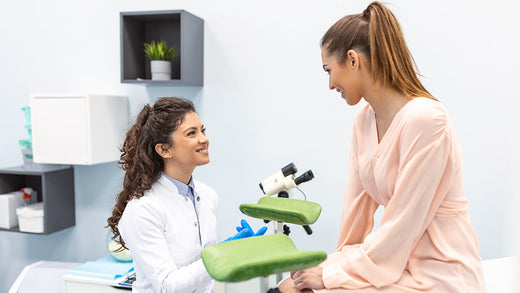What is HPV and What are the Symptoms?
Find out moreHuman Papillomavirus (HPV) is one of the most common viral infections, affecting millions of people worldwide. Often asymptomatic (having no discernible symptoms), HPV can remain undetected for years while potentially leading to serious health risks, including cervical cancer.
Understanding HPV, how it spreads, its symptoms, and how to protect yourself is crucial for maintaining your health.
This blog provides comprehensive insights into HPV, its connection to cervical cancer, and how Check4Cancer’s Cervical Cancer Screening Test offers a reliable, comfortable at-home screening solution.
What are the symptoms of HPV?
HPV often shows no visible symptoms, which can make it difficult to detect. However, some strains of the virus can result in:
- Genital warts: Small bumps on the genital or anal area, which are often painless but may cause discomfort.
- Abnormal pap smear results: Certain high-risk strains of HPV can cause cellular changes in the cervix.
- Lesions in the mouth or throat (less common): Linked to certain strains of HPV.
Are all warts HPV?
Not all warts are related to HPV. While some types of HPV cause genital warts, other strains may lead to common warts such as those found on fingers, hands, or feet. It's important to distinguish between these variations, as low-risk HPV strains causing warts are generally not linked to cancer.
Are HPV symptoms different for men and women?
HPV symptoms can differ by gender. For women, HPV is more commonly associated with abnormalities in cervical cells, which can lead to cervical cancer if untreated. Men may experience genital warts or, rarely, cancers of the throat, anus, or penis. However, in most cases, HPV is asymptomatic for both men and women.
How does HPV spread?
HPV is primarily transmitted through intimate skin-to-skin contact. It can spread via:
- Vaginal, anal, or oral sex with an infected partner.
- Sharing personal items like razors, although this is rare.
- Skin contact with infected areas (even without penetration).
Who is most likely to be affected by HPV?
Anyone who is sexually active can contract HPV, regardless of age or gender. However, individuals with weakened immune systems or those with multiple sexual partners are at a higher risk of infection.
What causes HPV?
HPV is caused by exposure to one of the virus’s many strains through physical contact. It’s worth noting that some strains are low-risk, causing harmless warts, while others are high-risk, having the potential to cause cancer.
What are the risks of HPV?
HPV can lead to numerous health concerns, particularly when left untreated:
-
Cervical cancer: One of the most serious risks, caused by high-risk HPV strains.
- Oropharyngeal cancer: Affecting the back of the throat, tonsils, or base of the tongue.
- Other genital Cancers (rarely): Such as anal or penile cancer.
- Genital warts: Though not life-threatening, they can cause discomfort and emotional distress.
Is HPV cancer?
While HPV itself is not cancer, high-risk HPV strains can cause changes in cellular DNA, increasing the likelihood of developing cancers such as cervical cancer. Regular screening is vital for early detection.
Can HPV turn into cervical cancer?
Persistent infection with high-risk HPV strains can lead to cervical cancer. The virus integrates into cervical cells, causing abnormalities that can progress over time if left untreated.
How long does it take HPV to turn into cancer?
It can take 10 to 15 years or longer for high-risk HPV to cause significant changes in cervical cells that lead to cancer. This slow progression emphasises the importance of regular screening.
Is HPV an STD?
HPV is considered a sexually transmitted infection (STI). However, it is unique in its prevalence and ease of transmission, making it one of the most common STIs globally. Many people contract HPV shortly after becoming sexually active without realising it.
How to test for HPV?
Cervical screening is the most effective way to detect high-risk HPV strains. Check4Cancer’s Cervical Cancer Screening Test offers a cutting-edge at-home testing kit that makes the process simple, comfortable, and reliable.
Benefits of a Cervical Cancer Screening Test:
- No need for a GP visit or internal examination.
- An at-home sample collection kit that is easy to use.
- Personalised screening program tailored to your needs.
- Full clinical support, guidance, and referrals when necessary.
- Results delivered quickly—within just five days!
- NHS-endorsed HPV screening solution
How to prevent HPV?
Preventing HPV involves taking proactive measures, including:
1. HPV vaccination: Available for both men and women, vaccines like Gardasil protect against high-risk and low-risk HPV strains.
2. Safe practices: Using condoms consistently can lower the risk of contracting HPV, but it does not eliminate it entirely as HPV can infect areas not covered by condoms.
3. Regular screenings: Regular cervical screenings can catch HPV and any abnormal cells early, preventing progression to cancer.
Is HPV curable, and how long does it last?
While there is no cure for HPV, most HPV infections clear up naturally within 1 to 2 years as the immune system fights the virus. However, persistent infections with high-risk strains require medical attention.
What to do if you get HPV?
If you test positive for HPV, firstly, don’t panic. Most HPV infections do not lead to severe health issues. However, here are steps to take:
1. Follow up: Schedule a follow-up appointment or consultation as needed to discuss results and next steps. Our Cervical Cancer Screening Test provides full clinical support and guidance for its users.
2. Monitor your health: Regular screening and check-ups will ensure that any changes are detected early.
3. Consider treatment (if necessary): Address any resulting complications, such as warts or precancerous changes, promptly with the help of healthcare professionals.
Take control of your cervical health.
Check4Cancer’s Cervical Cancer Screening Test provides women with a compassionate, convenient, and reliable way to stay on top of their cervical health. Cervical cancer is preventable with early detection and proper management, and the first step starts with knowing your HPV status.
Stay proactive. Stay informed.
Because it’s always better to know…

Jullien Brady
Clinical Advisor for Cervical Cancer
Consultant Gynaecologist. Professional Clinical Advisor for Colposcopy for Public Health England. Member of the Executive Committee of the BSCCP. Jullien Brady has an international reputation as a leading expert in the field of colposcopy and cervical screening. He is a former National Quality Assurance Director for the NHS Cervical Screening Programme and Professional Clinical Advisor for Colposcopy for Public Health England. He was a member of the Executive Committee of the BSCCP, the governing body of Colposcopy for over a decade. Mr Brady is passionate about women having the opportunity to maximise their health choices and screening options.
Find out moreKnowledge and support
Go to all articles
HPV Awareness Day
The International Papillomavirus Society (IPVS) established March 4th as HPV Awareness Day, in 2018. It provides an opportunity to highlight...
Read more
What is HPV and What are the Symptoms?
Understanding HPV, how it spreads, its symptoms, and how to protect yourself is crucial for maintaining your health.
Read more
Does A Smear Test Hurt?
What happens at a smear test, does it hurt or not, what to do if you experience any side effects...
Read more